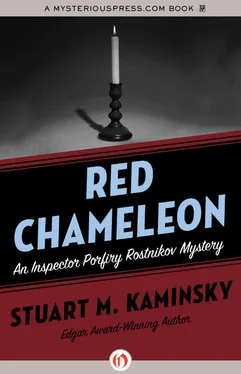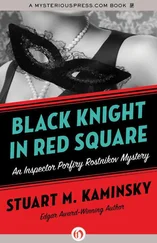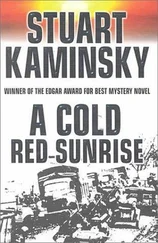Stuart Kaminsky - Red Chameleon
Здесь есть возможность читать онлайн «Stuart Kaminsky - Red Chameleon» весь текст электронной книги совершенно бесплатно (целиком полную версию без сокращений). В некоторых случаях можно слушать аудио, скачать через торрент в формате fb2 и присутствует краткое содержание. Год выпуска: 2012, ISBN: 2012, Издательство: MysteriousPress.com/Open Road, Жанр: Полицейский детектив, на английском языке. Описание произведения, (предисловие) а так же отзывы посетителей доступны на портале библиотеки ЛибКат.
- Название:Red Chameleon
- Автор:
- Издательство:MysteriousPress.com/Open Road
- Жанр:
- Год:2012
- ISBN:978-1-4532-6632-8
- Рейтинг книги:4 / 5. Голосов: 1
-
Избранное:Добавить в избранное
- Отзывы:
-
Ваша оценка:
- 80
- 1
- 2
- 3
- 4
- 5
Red Chameleon: краткое содержание, описание и аннотация
Предлагаем к чтению аннотацию, описание, краткое содержание или предисловие (зависит от того, что написал сам автор книги «Red Chameleon»). Если вы не нашли необходимую информацию о книге — напишите в комментариях, мы постараемся отыскать её.
Red Chameleon — читать онлайн бесплатно полную книгу (весь текст) целиком
Ниже представлен текст книги, разбитый по страницам. Система сохранения места последней прочитанной страницы, позволяет с удобством читать онлайн бесплатно книгу «Red Chameleon», без необходимости каждый раз заново искать на чём Вы остановились. Поставьте закладку, и сможете в любой момент перейти на страницу, на которой закончили чтение.
Интервал:
Закладка:
“If you are the police,” she said slowly, “then you can simply have this building examined when you leave here. In that case, there would be no point in denying what we have here.”
“Wait,” Sasha said, stepping forward, uncomfortably warm, wanting to loosen his absurd tie.
“If you are who you say you are, however,” she went on, paying no attention, “then we might as well attempt to negotiate. You are good-looking enough, but you don’t strike me as either discreet or terribly intelligent.”
Tkach’s vodka tremor turned to anger, but he controlled it, recognizing that the woman might be testing him. In one sense, it didn’t matter. She had as much as confessed, and she was quite right: all he had to do was force his way past her, go to the nearest phone, and have the place surrounded in a few minutes. But now he wanted to play this game through, to beat her. If it was chess they were to play, he wanted her respect when the game was over.
“I’m not accustomed to insults,” he said, letting some of his anger out. “I went to Moscow University. I am certified in economics. I-” he fumed angrily, hoping that he was playing his role with indignation.
A smile touched the quite lovely full lips of the woman. Tkach did not like the smile or the words she spoke.
“Come,” she said. “I’ll show you some cars, and perhaps we can make a deal.”
At this point Tkach considered that it might be wiser to concede the chess game and win the war, but he did not get beyond the consideration. He felt the presence behind him and knew it was confirmed by the woman’s blue eyes that glanced over his shoulder. Someone was behind him, someone who would surely stop him or attempt to stop him if Sasha went for the door.
“Good,” Tkach said, sighing. “Do you have a drink of something? I’ve come a long way.”
He turned toward the wooden partition from beyond which the noise continued to come and found himself almost nose-to-nose with a man with a flattened, slightly red nose, a burly, rugged-looking man, and straight black hair falling over his forehead. He was well muscled, surly looking, and not at all pleased by the look that the woman was now giving to Sasha Tkach, whom she was beginning, apparently, to accept as someone she might well enjoy playing a game with.
On Gorky Street, across from the Central Telegraph Office, is the Moscow Art Theatre. The building is decorated with reproductions of the Orders of Lenin and the Red Banner of Labor awarded to the company. There is also a banner with the image of a seagull, the emblem of the theater, adopted from Chekhov’s play, which had its premiere at the Moscow Art Theatre. There are two other buildings of the Moscow Art Theatre, one on Moskvin Street, the other on Tverskoi Boulevard.
The Moscow Art Theatre was founded in 1898 by the theoretician-director Konstantin Stanislavski and Vladimir Nemirovich-Danchenko. Both Chekhov and Gorky were associated with the theater, which continues to specialize in the plays of the two authors.
Rostnikov had been in the theater only three times before this Saturday morning’s visit. It wasn’t that he disliked theater. On the contrary, he enjoyed the idea of theater, but his interest lay not in traditional performance but in those works that generated the energy of other places.
He had left word in Petrovka about where he was heading and had taken advantage of his temporary restoration to authority by ordering a car and driver and indicating that it was by order of the deputy procurator. The police garage had not questioned him, though the car had been five minutes late, during which time Porfiry Petrovich had stood in the street, making people uncomfortable by trying to imagine what crimes they were capable of. Murder, he knew, was within the scope of anyone, given the proper motive or circumstances. He never searched faces for murder. It was the pickpockets, robbers, and car thieves he tried to imagine behind the somber passing faces.
Tracking down Lev Ostrovsky had proved to be quite easy. The All-Russia Theatrical Society had furnished an address and the information that Ostrovsky, though he was eighty-three, still worked at the Moscow Art Theatre. So Rostnikov had sat back, watching the tall streetlamps hum past as the faceless driver went down Gorky Street and turned at the Art Theatre passage.
Getting inside proved slightly difficult. He had told the driver, a young man with a bulbous nose, to wait at the car. The man, in uniform, had nodded without expression. It had not only occurred to Rostnikov that the driver might be either a KGB man or an informant for the deputy procurator; it had been a certainty. Since Porfiry Petrovich’s unofficial demotion, he was watched, reported on, considered by various offices, each working separately, building files, wasting the time of many people. But, Rostnikov mused as he limped away from the locked front door and searched for a stage entrance, what useful work might they otherwise be performing, these people who spied on him? Perhaps they could be loaded on a truck and sent to Yekteraslav to work in the vest factory.
Washtub, he thought to himself, finding a heavy wooden door that did open, you fantasize too much. It will make you dream. Dreams will turn to hopes. Hopes will turn to longing. Longing will turn to despair. Despair will turn to laughter. And laughter will get you in trouble.
Beyond the wooden door, Rostnikov entered a dark world. A vast, high, dark world in contrast to the burning summer brightness of the outside. The smell of theater struck him. It was like old wood and comfortable carpeting and paint. His eyes adjusted and turned to the voice addressing him.
“What is it you want?” The speaker was a young woman in a black dress, her hair pulled back and tied with a black ribbon. She was vulpine beautiful, a type of face that suggested weary cleverness, of having seen so much that a little more would not be surprising. Her words challenged him to come up with a tale.
He reached into his rear pocket and grunted out his identification, noticing that his leather wallet was bulging and frayed. The bulge came partly from the bills he carried for needed purchases and partly from his unwillingness to part with little bits of paper on which notes were written to remind him of various things he never got around to doing.
The young woman’s eyes darted at the wallet and back to his face. He had no doubt that she had actually looked at the card. She appeared to be quite unimpressed. “I repeat, comrade inspector. What is it you want? We are in production at the moment and have-”
“Lev Ostrovsky,” he put in, looking around now that he could see. He was standing in a narrow corridor with a string of lights heading deep inside the building. To each side of the corridor were doors, but he could make out no sounds within them.
“I don’t-” She began with a sigh, which Rostnikov recognized as the prelude to dismissal.
“You will,” he assured her, cutting in again. It was time to assume a new role. “Lev Ostrovsky is here. I wish to see him immediately. I do not have time to watch you perform. I am in a good mood, a remarkably good mood considering many things I have no desire to share with you, but that mood can so easily become-” He held up his thick right hand palm down and let it flutter like a wounded bird.
The young woman folded her arms across her small breasts and let out her third sigh of the brief conversation. Rostnikov decided that she was not an actress. Her repertoire of mannerisms was too limited. Either she was without experience or simply had not cultivated her talents.
“Down this corridor,” she said through closed teeth and over a very false cordial smile. “Turn left at the end and then right.”
Читать дальшеИнтервал:
Закладка:
Похожие книги на «Red Chameleon»
Представляем Вашему вниманию похожие книги на «Red Chameleon» списком для выбора. Мы отобрали схожую по названию и смыслу литературу в надежде предоставить читателям больше вариантов отыскать новые, интересные, ещё непрочитанные произведения.
Обсуждение, отзывы о книге «Red Chameleon» и просто собственные мнения читателей. Оставьте ваши комментарии, напишите, что Вы думаете о произведении, его смысле или главных героях. Укажите что конкретно понравилось, а что нет, и почему Вы так считаете.












